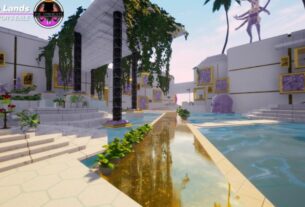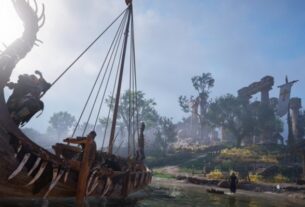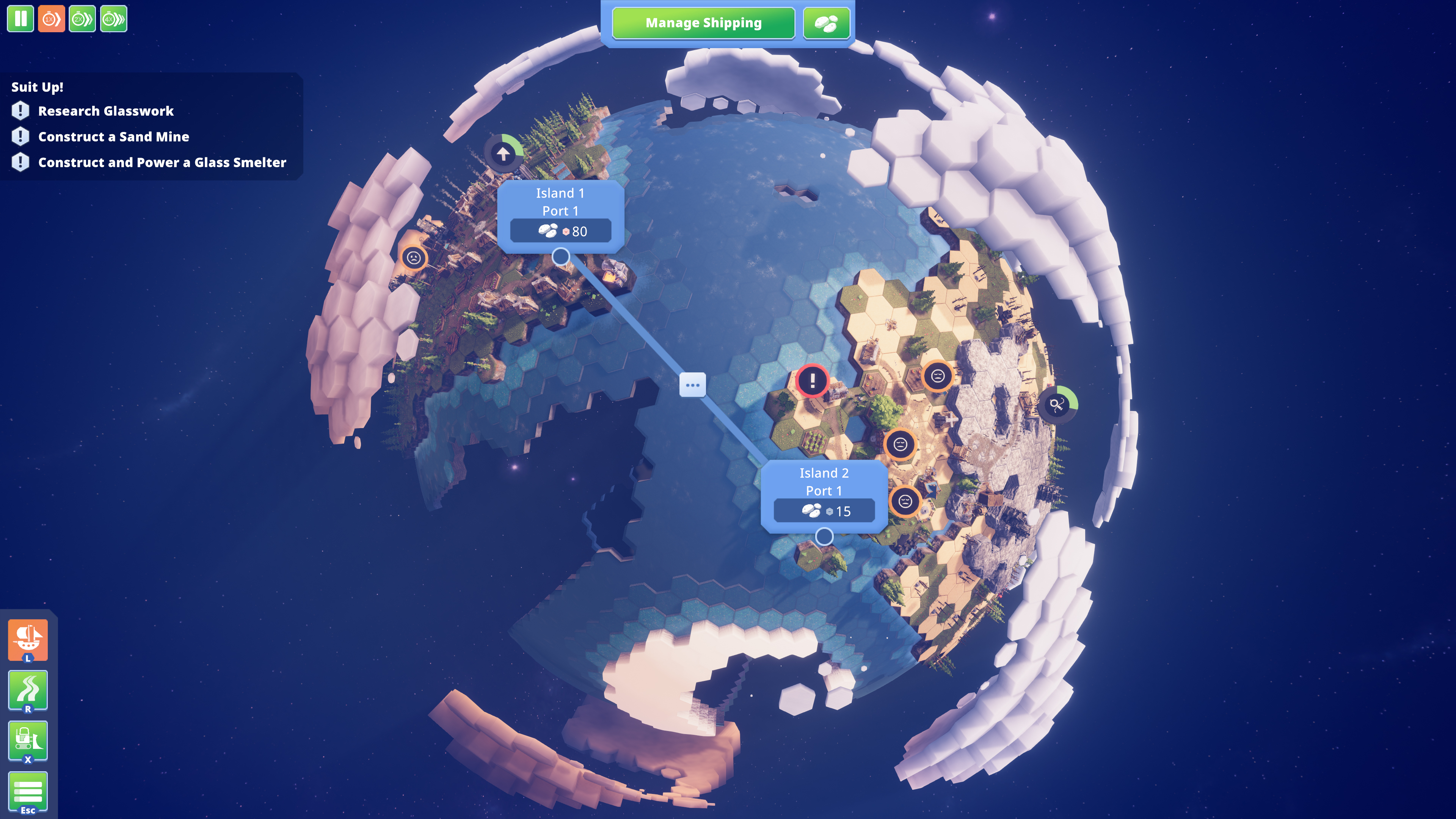
What is it? City-building 4X without the extermination.
Expect to pay £20/$20
Developer Balancing Monkey Games
Publisher In-house
Reviewed on Threadripper 2950X, 64GB RAM, GTX 1070Ti
Multiplayer No
Link Official site
Space whales. It’s a combination of words that leaps off the page at you, but the closest thing to an antagonist this gentle city-builder has aren’t to be feared: they’re only after your vegetables. Before We Leave is a non-violent city-building/4X game that wears its hexes proudly, a tiny bucolic sphere of them (plus 12 hidden pentagons to make it geometrically possible) hanging in the void whose inhabitants initially only know how to grow potatoes.
The citizens of your new civilisation emerge from the ashes of an old one—specifically, from a vertical-access nuclear bunker that looks rather like a repurposed missile silo. This not being Fallout, your priority is housing rather than slaughtering the local wildlife for trade goods, and it’s a rather wonderful world to emerge into, all fertile plains and rocky highlands. Humanity has been underground long enough for the Earth to regenerate, but not long enough to evolve into Morlocks. It’s a perfect balance.
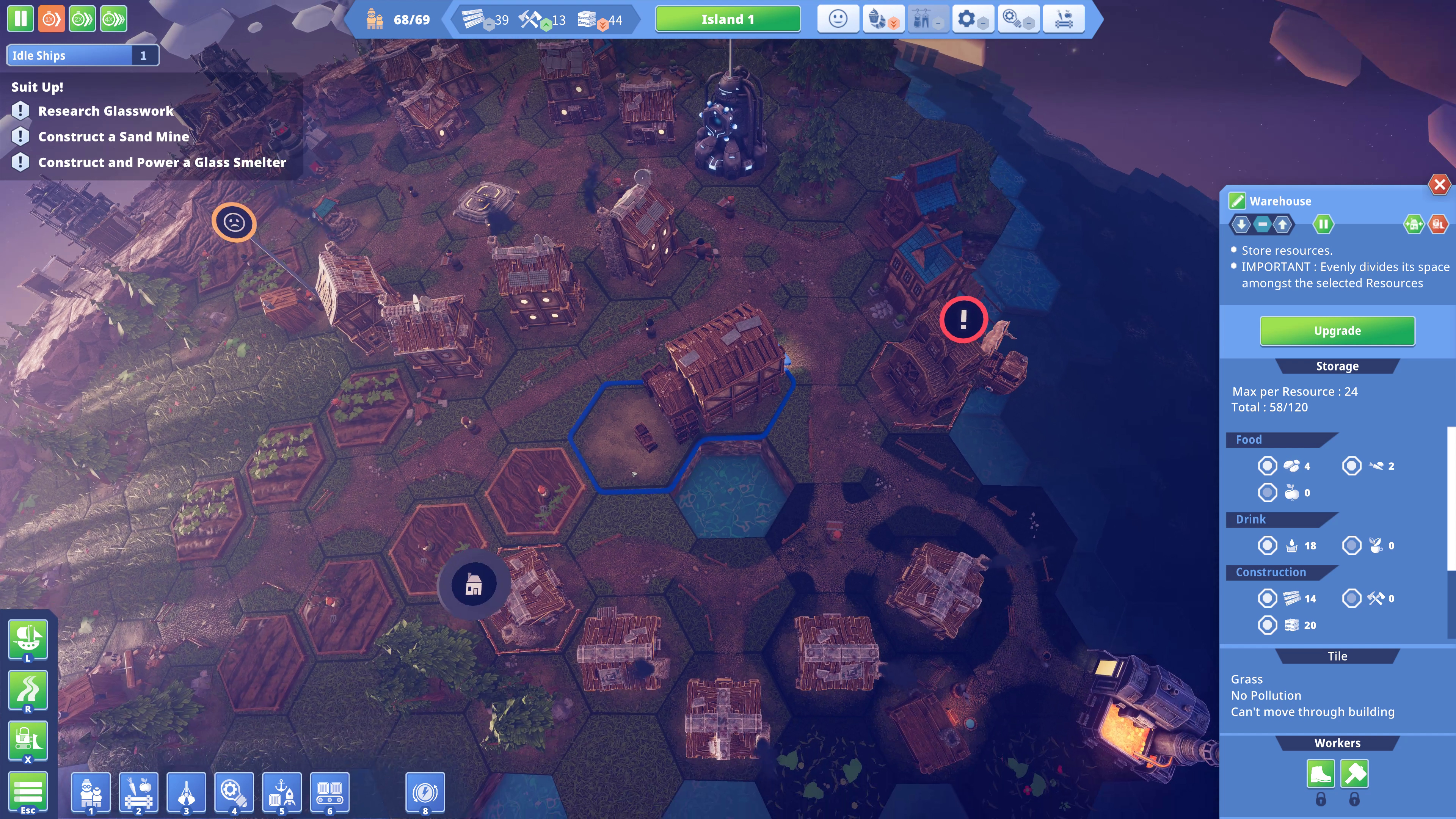
Despite the occasional bit of wreckage from the prior owners of the continent before they nuked themselves into wisps of plasma, the land is lush and forested. Deserts, rocks, ice and the like are introduced later, but everything is covered in a splendid layer of hex-clouds that retreat and reshape as you spin the globe around. Only the parts of the world you’ve explored are visible, meaning that for much of the time you’re looking at an arc in space.
Zoom out far enough and you can see the local star too, its light washing over everything. This means there’s a day/night cycle, which leads to changes in population behaviour, and makes it slightly harder to see what you’re doing, at night.
The citizens are, it has to be said, extremely cute. Like wooden toys they trundle around at quite a speed, even with the game running at 1x speed (up to 4x is possible, to pass the time while researching and producing the things necessary for progress). They are, however, known as ‘peeps’—a twee touch that borders on the unforgivable.
Look past this, though, and you find they are all individually named, are blessed with their own personality quirks, and have happiness levels that can be raised by cleaning up pollution (caused by industry, sucked up by forests or cleaners) improving their diet, building fountains or providing suitable clothing for the conditions they live it. That last one is particularly important, as your peeps don’t like being dressed in rags and being set loose in the desert, but clothing manufacture is a long way down the tech tree when you’re just starting out.
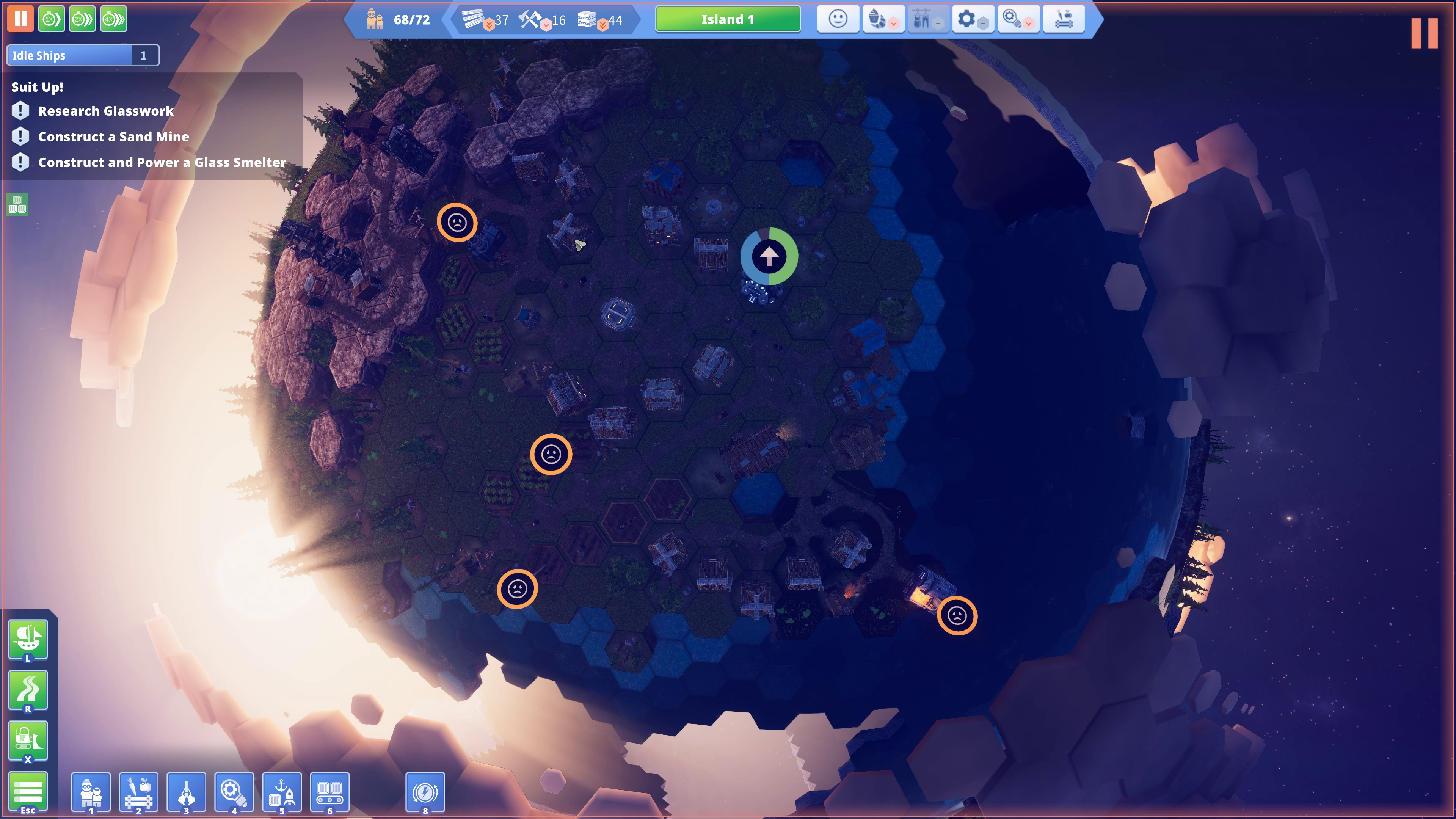
The hexes may recall Civilization, but Before We Leave actually has more in common with small-scale games such as Frostpunk. There’s none of that title’s relentlessly grim story here, though, and no micromanagement of power lines or budgets. There is the usual obsession with roads, however, and the message ‘This building must face a road’ is once again the bane of a player’s life.
You can spend time with the game on pause, plotting out a road network that will best serve the needs of an expanding village, or you can go freestyle from the start, reacting to the need for growth by demolishing one of the quaint little terrace of huts you built to make way for road access to the forest beyond, and maybe a woodcutting camp. Reduce peeps’ travel time between an iron mine and the smelter, and you’ll increase efficiency. This in turn increases your stock of materials, which leads to faster building. It’s like a reverse domino effect, the little plastic monoliths standing up ever faster after one is pushed up.
Explorers are essential, wandering the land to find caches of forebearer technology, and bringing it back to the library to research new technology of your own. Even this comes in two flavours, red and green, that can’t always be found on the same landmass. Other forms of ancient equipment can be repaired, like the Transmogrifier that turns raw materials into tools. The game regulates its pace through the happiness of your peeps, as if they’re feeling down they don’t work as fast. This leads to a regulated flow of new buildings, as a depressed population and the resulting lack of materials will bring building work to a halt.
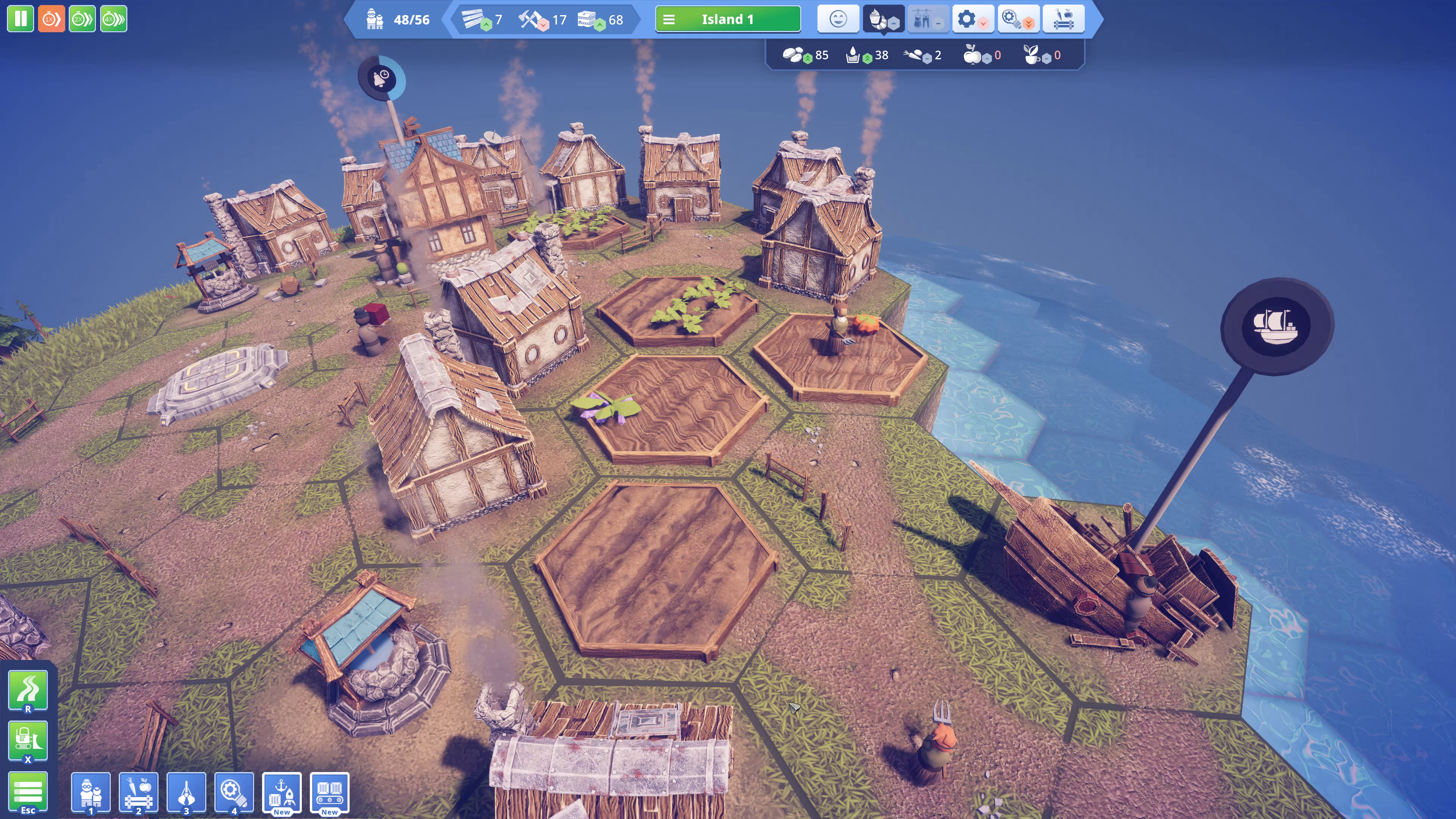
It’s a refreshing change to play a building game, especially one with 4X tendencies, that doesn’t act as a cover story for building up a mass of materiel and going on the rampage against other civilisations or trying to nuke Gandhi. A non-confrontational game also doesn’t force you to spend economic units on defence when you could be planting orchards and vegetable gardens, researching metalworking and repairing ancient ships.
No roaming gangs of bandits will come broiling over the hill with their gimlet eyes set on your valuables—your vault must have been the only one. Even the space whales, which appear only late in the game, aren’t too much of a problem. At first they leave devastation in their wake, hoovering up your greenery like the serene eating machines they are (they must be toothed whales, as baleen plates wouldn’t help when consuming an entire orchard, but cosmic cetacean spotting is a niche hobby). There are other mysteries to be found in orbit around your star too.
If there’s a goal to the game, it’s taking your nascent civilisation to the stars. Build rockets, and colonise the other planets in your solar system, which is randomly generated using a seed system. Getting gently to the end of the tech tree without firing a shot is satisfying in itself, and doing so in the knowledge you made your peeps happy even more so. The game’s eco-friendly message, and hopeful outlook on the future, provide a calming mood. Sometimes it’s nice just to build without worrying about it all being taken from you, and despite the frustration that can set in when everything slows down, Before We Leave nails that feeling.
Read our review policy
Cute little city-builder with big ambitions and even bigger cosmic cetaceans.


